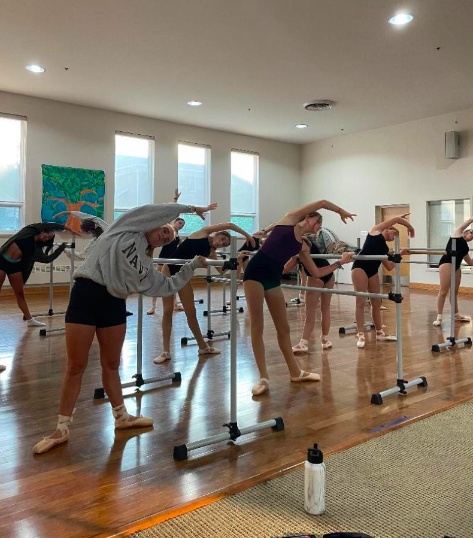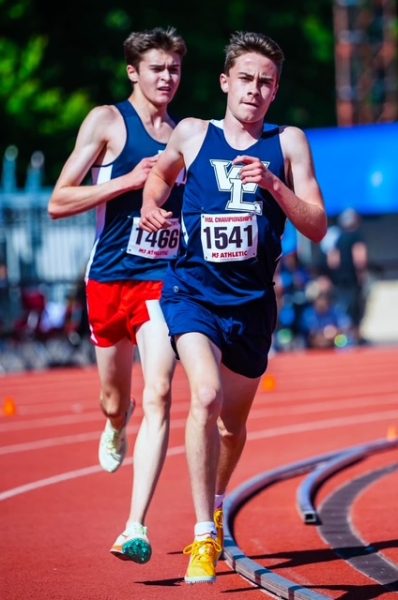Niche sports
Students who dance, fence, and spar

Gabriella Tamburro’s ballet class
Ballet is freeing, almost like you’re flying, according to Gabriella. She wouldn’t want to do any other sport. Sports that many people do not know about are called niche sports. Niche sports can be anything from archery to ballet to karate. These kinds of sports are generally not found at school, which makes students less likely to find them or be able to participate. Although the school offers several different sporting opportunities for students, some find that none of these really suit them.
Gabriella Tamburro is a freshman who does ballet and competitive dancing outside of school. She has been dancing since she was two years old, starting at Perfect Point and later moving to the more advanced Hillary’s Dance Company at the age of 5. Tamburro believes that dance of this sort should be offered at school.
“It’s a really great community,” Tamburro said. “[Ballet was never] in school and I never enjoyed any of the sports that were in school. I never really liked soccer, softball, field hockey, or lacrosse.”
Although she does not enjoy sports in school, she is part of the swim team. Just like sports in school, sports outside of school give kids a great opportunity to make more friends.
“The best part of ballet is the community is really good,” Tamburro said. “It’s a good way to get exercise without needing a lot of stamina…I have asthma so I can’t do certain sports.”
Tamburro thinks it is very important to have sports opportunities outside of general sports like soccer or basketball because some students are physically unable to participate because of things like asthma. Another reason why niche sports, like ballet, could be a great addition to school sports is that it gives students the chance to participate in sports that they physically might not be able to do otherwise.
“Sports outside of school tend to be more competitive, hardcore, and more time committing,” Tamburro said. “I think if you really want to take a certain sport seriously and commit your time to it, I would do it outside of school…if you want to just have fun and be on a team with low commitment, then sports inside of school are really good.”
Tamburro believes because of Arlington’s size and wide space schools have greater resources and places to create more sports opportunities for students.
“I think schools in Arlington could have a broader sports [selection] because we have a lot of facilities that we can use,” Tamburro said.
Arlington has plenty of space so Tamburro believes that it is reasonable to offer more niche sports like bowling and horseback riding.
Leo Dudley is a senior and does fencing and karate outside of school.
Last name values his health and believes exercise is very important and has greatly benefited from these sports in many ways, which is why he plays these sports.
“I picked karate initially to stay fit, [and to not be] lazing around the house,” said Dudley. “Fencing was really an extension of that, I wanted to get more competitive in sports so I decided to go with that.”
Students that play niche sports have said that they have been introduced to a large community of people that also enjoy it. Introducing these lesser-known sports into the community could also be a great way to learn about other cultures and traditions.
“I think that both of them have affected me in a good way,” said Dudley “They’ve helped my mental health, my physical health, they’ve given me communities of people to talk to.”
Dudley thinks that by adding more niche sports to school, students will have a broader selection to choose from and would not always have to look outside of school for these sports.
“It’s good to offer things to students in case they want them,” said Dudley. “Sports are obviously very popular, I think it’ll be good if schools offer more.”
Freshman Addy Rosen and Junior Anne Licato, both do synchronized swimming outside of school. Many do not think to differentiate this sport from general swimming, but Rosen and Licato would beg to differ.
Synchronized swimming is a sport with more coordinated and choreographed swimming, almost like dancing but in water. It is known to have more difficult moves and more breathing techniques.
“I mean, it’s so much breath control and so much like so many more muscles that you use. That’s working together as opposed to individual [swimming],” Licato said.
One of the biggest benefits niche sports players get when they play outside of school is newfound friendships. Most agree that the community is great along with the good exercise they get.
“I met a lot of new friends through this sport. And I’ve gotten stronger,” Rosen said, who also does swimming in school.
Licato and Rosen would recommend this sport but with small cautions. A downfall to doing sports outside of school is needing good time management, and at times these sports can be pricey.
“Yeah, but at the same time, we lose a lot of our time because it takes up a lot of our time during the week,” Licato said. “I would [recommend synchronized swimming], but it’s hard to like get into it. It’s expensive,” Rosen said.
Just like other niche sports players, Licato and Rosen believe niche sports would be a great addition to school sports as they are less known and could open new doors for students who are interested.
“I think there’s a lot of potential with niche sports,” Dudley said.
What did you think about this story? Do you have any suggestions for improvements or other articles that you would like to see? Please use the contact form to communicate with us! (Keep all information school-appropriate)
https://docs.google.com/forms/d/e/1FAIpQLSeRYRWwLLzvs2rqwHSGdr-DQRvxhUSx9UcaXypXxnvVuCqwyA/viewform










